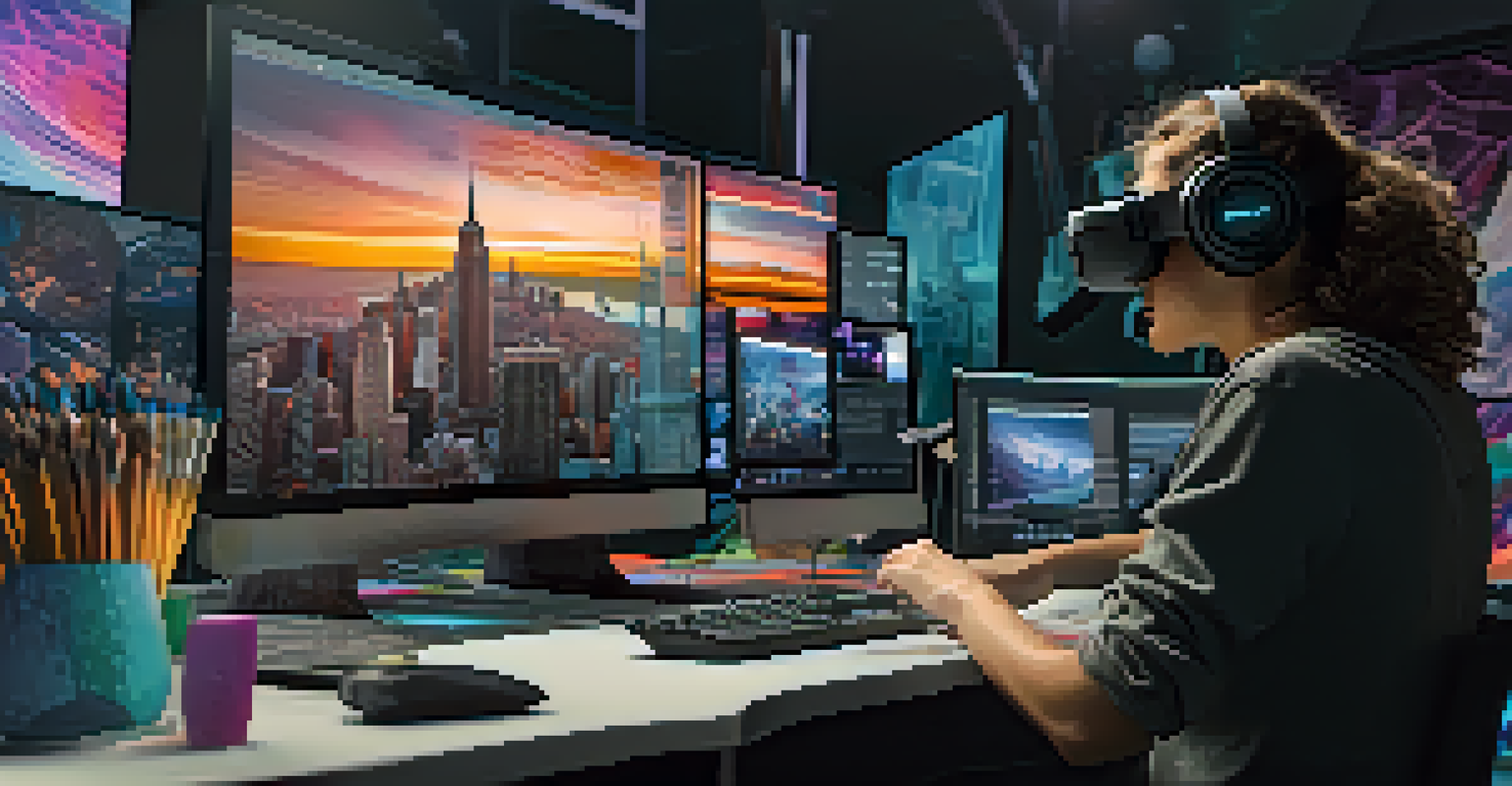Navigating Careers in Virtual Reality: Skills for Success

Understanding the Virtual Reality Landscape
Virtual reality (VR) is rapidly growing, transforming various industries such as gaming, education, and healthcare. As this technology evolves, so does the demand for skilled professionals who can innovate within this space. Understanding the current landscape of VR helps you identify potential career paths and opportunities that align with your interests and skills.
Virtual reality is not just a tool for entertainment; it’s a new frontier for learning, healing, and experiencing life in ways we never thought possible.
From VR developers to designers and marketers, there are numerous roles to explore. Each position requires a unique blend of technical and creative skills tailored to the specific demands of the industry. By familiarizing yourself with the landscape, you position yourself to make informed decisions about your career trajectory.
Additionally, staying informed about emerging trends and technologies will give you a competitive edge. The more you know about the latest advancements in VR, the better equipped you'll be to seize opportunities as they arise.
Key Technical Skills Needed in VR Careers
Technical skills are the backbone of any VR career. Proficiency in programming languages like C# and C++ is often essential for those looking to develop VR applications or games. Familiarity with game engines such as Unity or Unreal Engine can also set you apart from other candidates.

In addition to coding skills, a solid understanding of 3D modeling and animation is crucial. Tools like Blender or Autodesk Maya are commonly used in the industry, and being adept at these can help you create immersive virtual environments. This combination of skills allows you to contribute effectively to VR projects.
Explore Diverse VR Career Paths
Various roles in virtual reality, from developers to designers, require a mix of technical and creative skills tailored to industry demands.
Lastly, knowledge of user experience (UX) design principles is increasingly important. Creating intuitive and engaging experiences in VR requires a deep understanding of how users interact with virtual environments. By blending technical abilities with UX insights, you can create compelling experiences that resonate with users.
The Importance of Creativity in VR Development
While technical skills are vital, creativity plays a significant role in the success of VR projects. The ability to think outside the box can lead to innovative solutions and unique experiences that captivate users. As VR continues to evolve, creative minds are needed to push the boundaries of what’s possible.
The future of virtual reality will not just be about making things look real, but about making them feel real.
Imagine a new VR game that not only entertains but also educates players about history through interactive storytelling. This kind of creative approach can engage users in ways that traditional methods cannot. By merging creativity with technology, you can craft experiences that leave a lasting impact.
Moreover, collaboration with other creative professionals, such as writers and artists, can enhance your projects. Diverse perspectives can lead to richer, more engaging content that appeals to a broader audience. Embracing creativity in your work can set you apart in this competitive field.
Soft Skills for Successful VR Professionals
In addition to technical and creative skills, soft skills are crucial for thriving in the VR industry. Communication, teamwork, and adaptability are just a few examples of the interpersonal abilities that can make a significant difference in your career. Being able to articulate your ideas clearly and collaborate with others is essential in any workplace.
For instance, working on a VR project often involves cross-disciplinary teams, where designers, developers, and marketers must come together. Effective communication ensures that everyone is on the same page and working toward a common goal. Cultivating these soft skills will enhance your professional relationships and overall productivity.
Importance of Networking in VR
Building connections through networking and mentorship can provide valuable insights and open doors to new opportunities in the VR field.
Additionally, being adaptable is key in a field that is constantly changing. As new technologies and trends emerge, the ability to pivot and learn quickly will help you stay relevant and successful in your career. Embracing a growth mindset will empower you to tackle challenges head-on.
Networking and Building Connections in VR
Networking is an invaluable aspect of building a successful career in virtual reality. Engaging with industry professionals through conferences, webinars, and online forums can open doors to new opportunities. Building connections with others in the field allows you to learn from their experiences and gain insights into the industry's direction.
Consider joining professional organizations or online communities dedicated to VR. These platforms often provide resources, job listings, and networking events that can help you grow your professional network. Actively participating in these communities can enhance your visibility and credibility.
Moreover, don’t hesitate to reach out to potential mentors. Having guidance from someone with experience in the VR industry can provide you with valuable advice and insights as you navigate your career path. A mentor can also help you expand your network and introduce you to key players in the field.
Staying Informed About Industry Trends
To thrive in a fast-paced field like virtual reality, staying informed about industry trends is essential. Regularly reading articles, attending webinars, and following thought leaders on social media can help you keep your finger on the pulse of the industry. Awareness of current developments allows you to anticipate changes and adapt your skills accordingly.
Additionally, participating in online courses or workshops can help you learn about new tools and technologies. Platforms like Coursera or Udemy offer valuable resources that can enhance your skill set and keep you competitive. Embracing lifelong learning is vital in a field that is continuously evolving.
Stay Updated on VR Trends
Continuous learning and staying informed about industry trends are essential for adapting skills and remaining competitive in the evolving VR landscape.
By dedicating time to ongoing education and research, you position yourself as a knowledgeable professional. This proactive approach not only boosts your confidence but also makes you a valuable asset to potential employers seeking innovative thinkers who can navigate the complexities of VR.
Creating a Strong Portfolio to Showcase Skills
A strong portfolio is a critical asset for anyone pursuing a career in virtual reality. It serves as a visual representation of your skills and creativity, showcasing your best work to potential employers. Highlighting a diverse range of projects demonstrates your versatility and ability to tackle various challenges.
Consider including case studies that explain your thought process and the impact of your work. This added context can help potential employers understand your approach and problem-solving abilities. A well-organized portfolio not only showcases your skills but also tells your professional story.

Additionally, don’t forget to keep your portfolio updated as you take on new projects. Continuously refining and expanding your portfolio ensures that it reflects your current capabilities and interests. An up-to-date portfolio can make a lasting impression on employers and set you apart in the competitive VR job market.